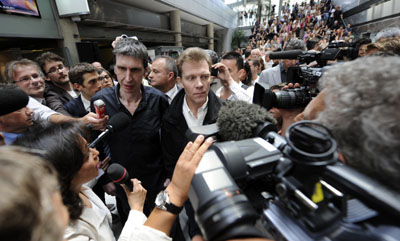Stéphane Taponier and Hervé Ghesquière, the two France 3 journalists held captive by the Taliban for 547 days, had a big surprise when they entered the France Télévisions building Thursday afternoon, a few hours after landing at the military base of Villacoublay, close to Paris, where they were welcomed by President Nicolas Sarkozy.
Hundreds of employees packed the halls, alleys, and galleries of this glass building anchored along the Seine, the heart of France’s sprawling public broadcasting system. They made their way through the crowd like rock stars, kissing, hugging and shaking hands. Never in the rowdy history of French journalism’ s hostage crises was a homecoming as intense and massive.
It was bound to be like that. France Télévisions, the umbrella for the national network France 2, the regional network France 3, half-a dozen radio stations, Radio France internationale and France 24, forms “une grande famille”, a large family where journalists and staff from all public channels claim to belong not only to a company but to a particular “school” of public service journalism.
Barely hiding their emotions Stéphane and Hervé had all the right words and pushed all the right buttons. They thanked everyone: the military and the secret services, the support committees, their colleagues and families. They calmly described their captivity (“we were not abused”), complained about the “Afghan mountain cuisine” (“please no more rice and red beans”) and underlined their addiction to two small radio sets that were tuned to the BBC and RFI, their flimsy links to the real world. “We heard about bin Laden’s killing. We discussed it with our captors who first thought it was U.S. propaganda and then said, when they had to accept the truth, ‘We are not Al-Qaeda, we are Taliban!'”
However the overwhelming presence of France Télévisions staff and top brass was also a clear message addressed to the French government. They wanted to remind everyone and especially state officials that Hervé and Stéphane were not loose cannons or irresponsible “yellow kids” as Sarkozy and his entourage had implied, but seasoned and reasonable journalists who knew how to assess risk before embarking on a dangerous assignment.
More fundamentally perhaps they showed up en masse to reaffirm the importance of independent journalism. France has been struggling for decades with the government’s endemic temptation to consider public television as an appendage of the state. This system was profoundly shaken and revamped in the 1980s when public service journalists largely gained their independence from the government. However in recent years they have come under irascible pressure again, particularly under Sarkozy, who has regularly been accused of political interference in public media. Inevitably the controversy on the “irresponsibility” of the two France 3 reporters was also seen in that context, as a battle for the soul of public television.
The first words of Hervé Ghesquière were meant to dispel any hint that he and his colleague had been reckless. “We did not try to climb the Northern face of the Everest with tongs and in shorts”, he said. “We took all the precautions that were needed. We were never warned by the army. We were just unlucky, the victims probably of a Taliban fighter who had infiltrated one of the checkpoints on the road and warned the hostage takers of our arrival”.
Contrary to other previous abductions, the Taponier and Ghesquière saga had turned into a tug-of-war between the state and the press on the right to decide what to cover and how to cover it. According the newspaper La Croix, the Elysée Palace and the Army were incensed because the abduction seemed to confirm to the world, as the U.S. army had complained, that the French contingent did not sufficiently control the region in the Kapisa province, east of Kabul, where they had been deployed. For months the tensions were rife between government officials who appeared determined to keep the case under the lid and the families and press freedom groups who wanted to campaign publicly as they had done it successfully for previous hostages.
Taponier and Ghesquière said the Paris controversies that roiled their first months of detention were closed now. They avoided another contentious question–whether a ransom had been paid–and they made it eminently clear that they wanted to go back as soon as possible to their passion and mission–news reporting.
On Thursday, in the middle of their colleagues and live on France 2 and France 3, the two freed hostages “gave a lesson in journalism,” wrote the daily Libération. It had a clear message to all: “We must continue to go to Iraq and Afghanistan and we must not always be embedded with the army.”
“Our honor,” added Thierry Thuillier, France Télévisions top news director, “is to go in the field and we’ll continue to do so.”
On Thursday afternoon in the halls of France Télévisions there were tears of joy but also that steely look of journalists determined to do their job without fear or favor.
